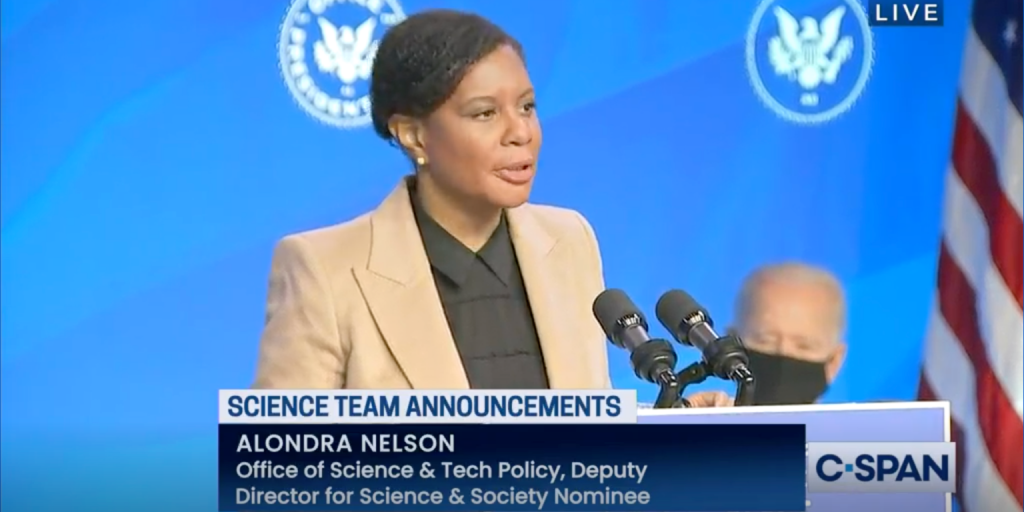
Technologies like artificial intelligence and human genome editing “reveal and reflect even more about the complex and sometimes dangerous social architecture that lies beneath the scientific progress that we pursue,” said Dr. Alondra Nelson today as part of the introduction of the Biden administration science team. On Friday, the Biden transition team appointed Nelson to the position of OSTP deputy director for science and society. Biden will be sworn in Wednesday to officially become the 46th president of the United States.
At its core, Nelson said in a televised ceremony, science is a social phenomenon, a reflection of people, their relationships, and institutions. So it really matters who’s in the room when new technology like AI is developed, she said, which is why for much of her career she’s sought to understand the points of view of people who are not typically in the room when emerging technology is developed. Connections between our scientific and social worlds have never been as stark as they are today, she said, and there’s never been a more important moment to situate scientific development in ethical values like equality, accountability, justice, and trustworthiness.
“When we provide inputs to the algorithm, when we program the device, when we design, test, and research, we are making human choices, choices that bring our social world to bear in a new and powerful way,” she said, adding that it mat. “As a Black woman researcher, I am keenly aware of those who are missing from these rooms. I believe we have a responsibility to work together to make sure that our science and technology reflects us, and when it does it reflects all of us, that it reflects who we truly are together. This too is a breakthrough. This too is an innovation that advances our lives.”
Nelson’s comments allude to trends of pervasive algorithmic bias and a well documented lack of diversity among teams deploying artificial intelligence. Those two trends appear to have merged when Google fired AI ethics co-lead Timnit Gebru last month. Algorithmic bias has been shown to disproportionately and negatively impact the lives of Black people in a number of ways, from use of facial recognition leading to false arrests to adverse health outcomes for millions or unfair lending practices. A study published last month found that diversity on teams developing and deploying artificial intelligence is key to reducing algorithmic bias.
Dr. Eric Lander will be nominated to serve as director of the OSTP and presidential science advisor. In remarks Saturday, he called America’s greatest asset its “unrivaled diversity” and science and tech policy that creates new industries and jobs but also ensures benefits of progress are “shared broadly among all Americans.”
“Scientific progress is about someone seeing something that no one’s ever seen before. Because they bring a different lens, different experiences, different questions, different passions. No one can top America in that regard, but we have to ensure that everyone not only has a seat at the table, but a place that the lab bench,” he said.
President Elect Joe Biden also spoke at the ceremony, starting the ceremony by referring to the team as a group that will help “restore America’s hope in the frontier of science” while tackling advances in health care and challenges like climate change.
“We have the most diverse population in the world that’s in a democracy and there’s so much we can do. I can’t tell you how excited we’ve been about doing this. We saved it for last. I know it’s not you know, not naming Department of Defense or attorney general but I tell you what: You have more impact on what our children are going to face and our grandchildren are going to have opportunities to do than anyone,” he said.
As part of today’s announcement, Biden said the presidential science advisor will be a cabinet-level position for first time in U.S. history. Vice President Elect Kamala Harris, whose mother worked as a scientist at UC Berkeley, also spoke Saturday. She concluded her remarks with an endorsement of STEM education funding and acknowledgment of Dr. Kizzmekia Corbett, a Black woman scientist whose contributions helped create the Moderna COVID-19 vaccine.
The Biden-Harris campaign platform does pledge to address some forms of algorithmic bias. While the Trump administration signed some international agreements in favor of trustworthy AI, the president’s immigration policy and bigoted rhetoric made the Trump administration an unlikely leader in addressing how algorithmic bias can lead to discrimination or violation of civil rights.
Earlier this week, members of the OSTP in the Trump administration introduced the AI Initiatives Office to guide a national AI strategy following the passage of the National Defense Authorization Act (NDAA). The AI Initiatives Office might be one of the only federal offices with a neural network and eagle in its seal.





























